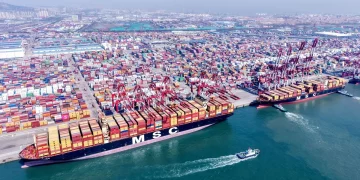Introduction
- Contextualizing Energy Prices: Introduce the topic by explaining the role of energy as a critical input in economic activity. Discuss how energy prices, particularly oil, gas, and electricity, play a central role in driving global production, transportation, and consumption.
- Energy and Economic Growth: Briefly explain the importance of energy in both developed and developing economies. Energy is a foundational factor that affects industrial output, consumer behavior, and inflation rates.
- Purpose of the Article: The purpose of this article is to explore how rising energy prices are affecting global economic growth, the mechanisms behind the price hikes, and how different regions and sectors are coping with these changes.
Section 1: The Dynamics Behind Rising Energy Prices
- Global Energy Market Overview: Provide an overview of the global energy market, highlighting key sources of energy (oil, natural gas, coal, and renewables) and how their prices are determined.
- Factors Driving Price Increases:
- Supply and Demand Imbalances: Explain how supply disruptions (such as geopolitical tensions, natural disasters, or pandemics) and increased demand due to economic recovery or industrial activity can lead to higher energy prices.
- Geopolitical Instability: Analyze the role of geopolitical issues, such as conflicts in oil-producing regions or sanctions on major energy exporters, in influencing energy prices.
- Climate Change Policies: Examine the impact of environmental regulations and the transition to renewable energy sources, which could increase costs in the short term due to shifts in production processes and infrastructure investments.
- OPEC and Non-OPEC Countries: Discuss the role of OPEC and other oil-producing nations in controlling supply, and how their decisions on production cuts or increases influence global energy prices.
- Factors Driving Price Increases:
- Energy Prices and Inflation: Explain how rising energy prices often lead to broader inflationary pressures, affecting goods and services across various sectors.
Section 2: Short-Term Effects on Global Economic Growth
- Impact on Consumer Spending and Inflation:
- Rising Energy Costs and Consumer Behavior: Analyze how higher energy prices, particularly fuel and electricity costs, impact household budgets. Discuss the broader effects on disposable income, consumer confidence, and spending patterns.
- Inflationary Pressures: Rising energy prices lead to higher costs for transportation, heating, and manufacturing. This results in overall inflation, affecting the purchasing power of consumers and the cost structure of businesses.
- Wage-Price Spiral: In certain cases, rising prices might result in demands for higher wages, which in turn could further drive inflation, creating a vicious cycle that affects the real economy.
- Impact on Business and Industrial Sectors:
- Higher Operating Costs for Businesses: Discuss how industries such as manufacturing, agriculture, and transportation are especially vulnerable to rising energy prices, as their cost of production increases.
- Reduced Profit Margins: Analyze how higher energy prices affect the profitability of companies, particularly those that are energy-intensive. In some cases, businesses might be forced to pass on the higher costs to consumers, further fueling inflation.
- Investment Slowdown: Rising energy prices could lead to a reduction in business investment. Companies may cut back on expansion plans due to the increased cost burden, which in turn slows overall economic growth.
- Transportation and Supply Chain Disruptions:
- Increased Transportation Costs: Rising fuel costs directly impact the transportation sector, increasing the cost of shipping goods across borders. This has implications for global supply chains, particularly in sectors such as retail, manufacturing, and agriculture.
- Global Supply Chain Stress: Supply chain disruptions due to higher energy prices could lead to delays and shortages, impacting the availability of goods in the global market. Countries dependent on imports for key products might experience more severe shortages and price hikes.
Section 3: Long-Term Effects on Economic Growth
- Global Economic Growth and the Role of Energy:
- The Economic Growth-Price Elasticity of Energy: Explore how rising energy prices affect long-term global economic growth, focusing on both developed and developing economies. Higher energy costs can slow down economic growth, particularly in energy-intensive industries.
- Energy Transition and Structural Change: Examine how the shift toward renewable energy and cleaner technologies might create long-term effects on economic growth. In some cases, rising energy prices might accelerate the transition to cleaner energy, which could have both positive and negative economic consequences.
- Decoupling from Fossil Fuels: Discuss the long-term impact of countries moving away from fossil fuel reliance. Some economies may benefit from renewable energy sources like solar and wind, while others may struggle with the transition, particularly those that depend heavily on fossil fuel exports.
- Impact on Energy-Importing vs. Energy-Exporting Countries:
- Energy-Importing Economies: For countries that import large quantities of energy, higher prices could lead to trade imbalances, inflation, and a reduction in real income. The economic impact on developing nations and emerging economies that rely on energy imports is particularly significant.
- Energy-Exporting Economies: On the other hand, countries that export energy, such as Russia, Saudi Arabia, and other OPEC members, stand to benefit from rising energy prices, potentially seeing an increase in revenue. However, even these economies face challenges, such as the need to diversify their economies and manage the long-term effects of dependency on oil and gas revenues.
- Impact on Global Financial Markets:
- Stock Market Volatility: Energy price fluctuations often lead to volatility in global financial markets. Investors react to changing oil prices and energy stocks, leading to unpredictable swings in stock indices. Higher energy prices can also increase the risk of stagflation, where high inflation is coupled with low or stagnant economic growth.
- Investment Shifts: As energy prices rise, investors may shift their focus toward sectors that are seen as more resilient, such as technology, healthcare, or renewable energy. This shift in investment preferences can have significant implications for global capital flows.

Section 4: Regional Variations and Impacts on Developed vs. Developing Economies
- Developed Economies and Energy Prices:
- European Union’s Energy Crisis: In Europe, many countries are dependent on energy imports, particularly natural gas and oil. The economic slowdown caused by rising energy prices can have devastating effects on industries such as manufacturing, which rely on cheap energy to remain competitive.
- The U.S. and Energy Independence: The United States, with its growing energy independence due to the shale oil boom, might be less vulnerable to global price increases. However, higher global prices can still affect consumer behavior, increase inflation, and slow down overall economic growth.
- Japan and Energy Vulnerability: Japan, another major energy importer, faces challenges related to energy security. Rising energy prices could negatively affect the Japanese economy, which is heavily reliant on energy imports for its manufacturing and technology sectors.
- Developing Economies:
- Impact on Emerging Markets: Emerging market economies, especially those in Africa, South Asia, and Latin America, are likely to suffer the most from rising energy prices. Energy costs represent a larger share of household and business expenses in these regions, and higher energy prices could lead to slower growth, higher inflation, and social unrest.
- Energy Price Subsidies and Fiscal Pressures: Many developing countries subsidize energy prices for consumers, and these subsidies become increasingly difficult to maintain when energy prices rise. Governments may face fiscal deficits and be forced to reduce subsidies, which can lead to political instability.
- Global Trade Shifts and Regional Cooperation: The rise in energy prices might also lead to shifts in regional trade dynamics. For example, countries that produce or import energy within the same region may find it beneficial to form trade alliances to manage price increases and mitigate the economic impacts.
Section 5: Policy Responses to Rising Energy Prices
- Monetary and Fiscal Policies:
- Central Bank Responses: Central banks may respond to rising energy prices with higher interest rates in an attempt to curb inflation. However, this could further slow economic growth and create a stagflationary environment, where inflation is high but economic activity is sluggish.
- Government Interventions and Subsidies: Some governments may step in to mitigate the effects of rising energy prices on consumers and businesses. This could include subsidies for energy costs, tax breaks for businesses, or direct cash transfers to households.
- Long-Term Energy Policy: Governments may also push for long-term strategies to reduce dependence on fossil fuels and invest in renewable energy technologies to mitigate future price shocks.
- Global Cooperation and Energy Security: As energy markets are highly interconnected, global cooperation will be essential to address energy price volatility. Countries may need to work together to ensure energy security, particularly in times of geopolitical tension or crisis.
Section 6: Conclusion
- Summary of Key Insights: Recap the main points about how rising energy prices will affect global economic growth, touching on both short-term and long-term effects, as well as the impact on developed and developing economies.
- Future Outlook: The long-term effects of rising energy prices will depend on the speed of the energy transition, the effectiveness of government policies, and how businesses and consumers adapt to new energy realities. Global cooperation and innovation in clean energy will be key to mitigating some of the negative impacts.
- Call for Action: Encourage international collaboration on energy security, sustainable energy development, and coordinated fiscal and monetary policies to address the challenges posed by rising energy prices.































